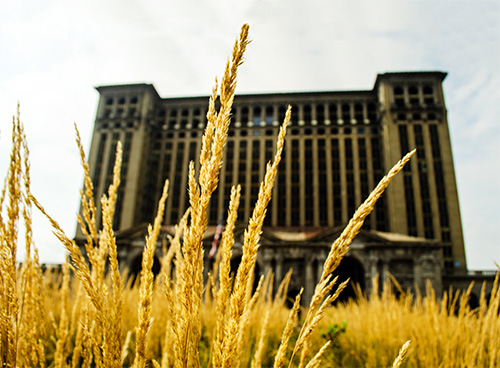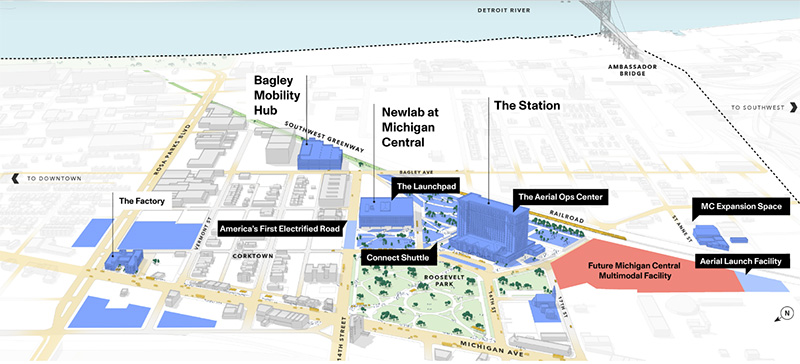Detroit Launches $40M Effort to Rebuild Intercity Rail Hub at Michigan Central

A three-party memorandum of understanding signed Oct. 15 commits $40 million to engineering and environmental work for a new multimodal transit hub that could re-establish passenger rail service at Detroit’s Michigan Central campus by the end of the decade.
The agreement, announced jointly by the Michigan Dept. of Transportation, the City of Detroit and Michigan Central, combines $10 million in federal RAISE funding — short for Rebuilding American Infrastructure with Sustainability and Equity — with $30 million in state contributions to launch preliminary design and environmental review.
According to documents examined by ENR, the federal award was issued earlier this year and remains active—with no indication of rescission—though RAISE grants are subject to obligation deadlines that determine when funds are formally committed.
Officials said the planning phase will define the project’s scope, delivery approach and schedule before any construction moves forward.
Michigan Gov. Gretchen Whitmer (D) said the plan “lays the foundation for a new multimodal transportation hub that will grow our regional economy,” calling it a critical investment in both “mobility and opportunity.”
A Symbolic Return
Completed in 1913 and once one of the nation’s most prominent rail terminals, Michigan Central Station closed to passengers in 1988 and sat vacant for decades before Ford Motor Co. acquired the property in 2018.
Wild grass once overtook the grounds of Detroit’s Michigan Central Station after decades of abandonment. Closed to passengers in 1988, the Beaux-Arts landmark became a symbol of the city’s decline until Ford Motor Co. began restoration work in 2018.
Image courtesy of Michigan Central
Following a $740 million restoration, Ford reopened the Beaux-Arts landmark in 2024 as the centerpiece of its Corktown mobility innovation campus.
The new MOU extends that revitalization beyond architecture. If realized, it would return Amtrak and intercity bus operations to the site for the first time in nearly 40 years. A new facility at Michigan Central would likely replace Detroit’s aging Amtrak station in the city’s New Center neighborhood.
City infrastructure chief Sam Krassenstein said residents “deserve a first-class facility for bus and train service, and this agreement puts us on a path to make it happen.”
Project partners said the funding covers engineering and environmental review and will help define ownership structure and delivery model. MDOT plans to coordinate with Amtrak and the Federal Railroad Administration to assess the feasibility of restoring intercity service.
Beth Kmetz-Armitage, Michigan Central’s director of commercial development, said the initiative is about “strengthening regional connections — both immediately regional in Ann Arbor and broadly Midwestern all the way to Chicago.”
While no final alignment has been set, MDOT officials said the plan could eventually extend Amtrak’s Wolverine line from Chicago through Windsor, Ontario, to connect with VIA Rail service to Toronto. Amtrak has indicated such a cross-border link could be achieved with minimal new capital investment, pending regulatory and customs agreements.
Kmetz-Armitage said in a press conference that an existing rail line already connects Toronto to Chicago under the Detroit River, but is currently used only for freight traffic.
Plans call for a new multimodal transit hub west of the station, on Ford-owned land, where passengers could board beginning in 2028. According to Michigan Central, early projections estimate about 66,000 annual riders once the hub is operational.
The restored station itself would not serve as a boarding point; instead, travelers to and from Canada would pass through customs and border control in Windsor, Ontario. She said the planned facility would also improve westbound connections along Amtrak’s Wolverine corridor toward Chicago.
The MOU sets 2026 for completion of environmental studies and 2028 for final design and procurement, with operations targeted before 2030.
 A site map of Ford Motor Co.’s Michigan Central innovation campus in Detroit’s Corktown district shows the planned location of the future multimodal transit hub adjacent to the restored station. Image courtesy of Michigan Central
A site map of Ford Motor Co.’s Michigan Central innovation campus in Detroit’s Corktown district shows the planned location of the future multimodal transit hub adjacent to the restored station. Image courtesy of Michigan Central
Technical and Financial Context
MDOT’s 2023 Corridor Identification and Development submission to the Federal Railroad Administration describes the Detroit–Pontiac–Chicago corridor as a 304-mile route spanning Amtrak, Norfolk Southern, Canadian National and Conrail ownership.
The corridor has received multiple federal grants since 2010 for signaling, track upgrades and speed improvements; the Wolverine’s on-time performance averaged just 62% in fiscal 2022, according to MDOT’s application citing Amtrak’s status report.
The department manages about $100 million annually from the state’s Comprehensive Transportation Fund for passenger and freight programs. The Detroit hub would likely replace and consolidate the Howard Street intercity bus terminal downtown and the aging Amtrak station in the city’s New Center neighborhood.
Krassenstein said the plan builds on the station’s historical role as Detroit’s “gateway,” adding that re-establishing rail service “in the shadow of the station” revives a core part of the city’s infrastructure identity.
No contractor or joint venture has been named for the effort, and no procurement has been issued. MDOT and city officials said design and contracting decisions will follow completion of the environmental and preliminary engineering phases.
Bradley C. Wieferich, Michigan’s state transportation director, said the partnership “is a positive step to further develop Michigan Central into a true transportation hub and innovation ecosystem,” but added that additional federal coordination will be required before procurement.
While Detroit-based Christman–Brinker managed Ford’s restoration of Michigan Central Station, that joint venture has not been linked to the new rail hub. Public procurement records reviewed Oct. 16 show no active RFQ or RFP through the state’s SIGMA VSS or the city’s BidNet Direct portals.
Hurdles Remain
The project faces complex integration issues requiring coordination with freight operators for access tracks and platform space, as well as a review of regulatory and customs requirements under the 2019 U.S.–Canada Land, Rail, Marine and Air Transport Preclearance Agreement.
Environmental review will draw on archived FRA Tier 1 materials for the Chicago–Detroit–Pontiac corridor to update alignments and ridership forecasts.
Regional research by the Southeast Michigan Council of Governments on the Ann Arbor–Detroit commuter rail corridor will inform how the hub interfaces with local transit and Detroit Metropolitan Airport.
Michigan Central CEO Josh Sirefman said the project “brings together our legacy infrastructure and our future mobility,” adding that the hub aims to link “innovation, community access and cross-border connectivity.”
Whether those ambitions materialize, he said, will depend on aligning funding sources and “translating years of vision into engineered access and buildable design.”
The post "Detroit Launches $40M Effort to Rebuild Intercity Rail Hub at Michigan Central" appeared first on Consulting-Specifying Engineer

